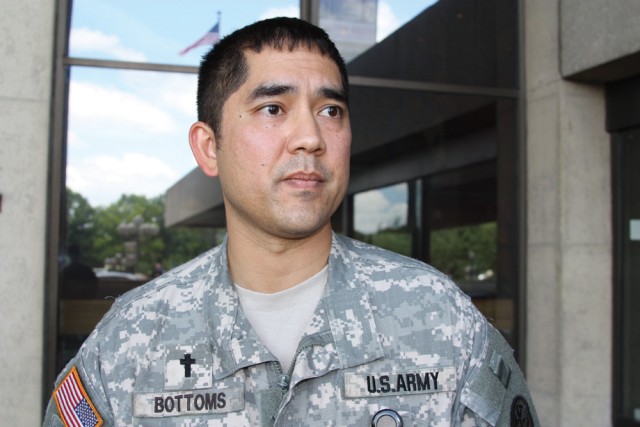WASHINGTON (Army News Service, June 26, 2009) -- Several Walter Reed Army Medical Center staffers survived the deadliest accident in Washington Metrorail's 33-year history Monday.
Maj. David Bottoms, a Walter Reed chaplain and Col. Thomas Baker, chief of pathology, said they were both riding in the first car of the train that slammed into another stopped train during Monday's rush-hour commute home.
"I was reading and listening to my iPod, and I noticed the front end of the car was buckling and it was coming toward us. It looked like a wave ... it stopped three seats in front of me ... I was praying then," Bottoms said.
Baker stood in the rear of the car. "It was very scary. Oh my God. It was a very surreal event," he said.
"I heard a loud boom, and the first portion of the car [of the stopped train] went up in the air," like a roller coaster, Baker said. "When the dust cleared, I saw the sky and the top of the train that we hit. There was no front of the train, no floor of the train of that one car."
Five cars behind Bottoms and Baker, Arlene Mitchell of Walter Reed's Medical Center Brigade Operations, rode in the last car of the train with two other Walter Reed staffers. Mitchell was not injured in the crash.
Baker suffered a bruised forearm and Bottoms remained unscathed.
The two officers reassured other passengers in that first train car immediately after the impact. Bottoms led the group in prayer.
"We had a moment where we were reminded of God's presence with us there," Bottoms said.
"The seats tumbled back into a big pile. We could hear someone yelling underneath them, but couldn't move the seats to get to her," Baker said.
Bottoms, an Anglican priest who just completed a year-long clinical pastoral education program at Walter Reed, tried to comfort the young woman trapped under the seats who was crying. He prayed with her.
"I talked with her, prayed with her and let her know that help was on the way, that we weren't going to leave her," he said. "In the Army chaplain program, we are trained to remain with the injured."
Bottoms said he was uncertain if the young woman made it; emergency responders cleared him and the other passengers out before she was removed from the wreckage. While Bottoms attended to the young woman, Baker comforted a young man crushed between two seats.
"He held my hand and wouldn't let go," Baker said. The pathologist said that he and Bottoms provided comfort care "for people we could see and hear. There was really nothing else I could do as a doctor."
According to Baker, it took 15 to 20 minutes for the first firefighter to get there and help them begin moving the pile of seats and release trapped passengers.
Baker arrived home around 8:30 Monday night. His co-workers checked in on the bachelor to ensure he was alright.
The physician said he usually leaves the office about 6 p.m., and catches the bus to his D.C. home, but Monday afternoon he left the office at 4:45 p.m., and decided to take Metro instead.
"Funny thing is, I was sitting in front of the car initially, right next to the conductor [who lost her life], but moved to stand by the door in the back of the car to catch the connecting train," Baker said.
The pathologist said he's not a very religious person and called himself very lucky. "It makes me think it was not my time," he said.
Baker wasn't the only Walter Reed staffer to narrowly escape death. Mitchell said she left work early on Monday and missed the train that ended up in the air. She caught the next with Bottoms and Baker, four minutes later.
"I always get in the last car," she said.
According to Mitchell, most Walter Reed personnel choose to ride in the first or "tail" car of the Red Line Metro train to make a quick exit out to catch their connecting trains. She said it was the grace of God that kept her alive.
"He allowed four more minutes to allow me to walk to the tail end of the train. That was his grace," said Mitchell.
(Sharon Renee Taylor writes for the Stripe newspaper at Walter Reed.)


Social Sharing